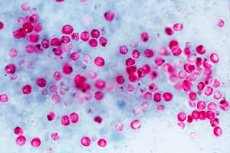New publications
Consumption of cabbage prevents the development of protozoal infestation
Last reviewed: 29.06.2025

All iLive content is medically reviewed or fact checked to ensure as much factual accuracy as possible.
We have strict sourcing guidelines and only link to reputable media sites, academic research institutions and, whenever possible, medically peer reviewed studies. Note that the numbers in parentheses ([1], [2], etc.) are clickable links to these studies.
If you feel that any of our content is inaccurate, out-of-date, or otherwise questionable, please select it and press Ctrl + Enter.

Natural components present in cabbage vegetables can prevent the development of such a disease as cryptosporidiosis. As a result of the new scientific work, scientists have the opportunity to bring preventive measures to prevent this protozoal infection to a new effective level.
Cryptosporidium infection is quite common among young children, especially those who have to live in unfavorable sanitary conditions. The disease causes severe diarrhea in babies, and recurrent cryptosporidiosis leads to cognitive impairment and growth retardation in children. The infection is particularly dangerous for immunocompromised patients - particularly those undergoing chemotherapy or on hemodialysis, who have hIV infection or have undergone transplant surgery.
Previously, only one drug, Nitazoxanide, was used to treat cryptosporidiosis. This drug is not effective in all cases and is not effective at all for the treatment of HIV patients. For this reason, scientists set themselves the task of finding a more effective drug that would be affordable at the same time.
Previous experiments have shown that patients with higher levels of indoles - heterocyclic organic compounds - in their feces are more resistant to infection. In their new work, the researchers traced exactly how indoles prevent cryptosporidiosis from developing. The scientists infected rodents with cryptosporidium in the laboratory, which led to the lesions in their small intestines.
Then, for 14 days, half of the rodents were offered food that did not contain indole, and the other half were offered food rich in indole-3-carbinol. This phytochemical compound is present in vegetables of the cabbage family - for example, in common white cabbage, cauliflower, broccoli. The substance has the ability to stimulate the aryl hydrocarbon protein receptor, which is responsible for preserving the quality of the intestinal epithelium and preventing the introduction of an infectious agent.
According to the results of the study, rodents that consumed indole had low levels of Cryptosporidium in their intestines compared to animals that ate food without indole. Moreover, in lactating females who ate cabbage vegetables, the newborn cubs also had protection against cryptosporidiosis.
According to the researchers, medications containing indole and the appropriate diet should be administered for prophylactic use to people living in sanitary-unfavorable conditions, or in regions with an increased risk of infection with protozoan infestation. It is recommended to take such preparations and adhere to the diet for nursing mothers.
Information source cELL
